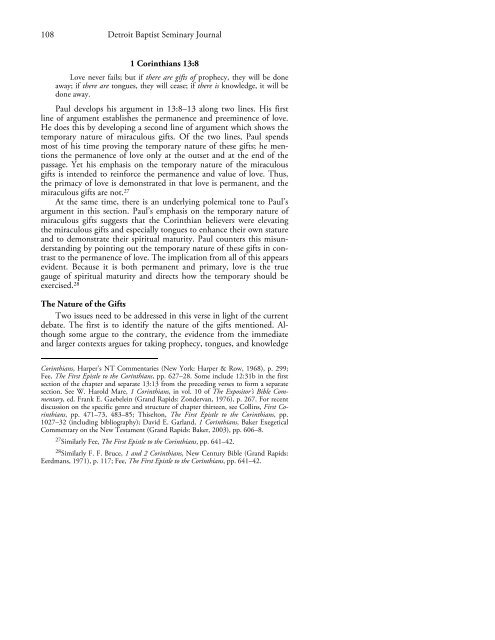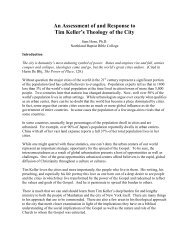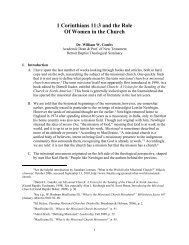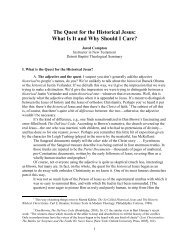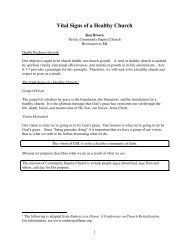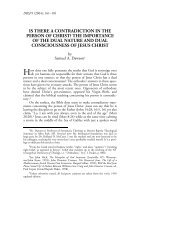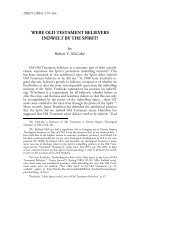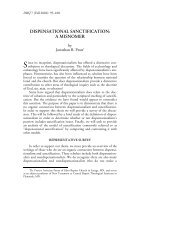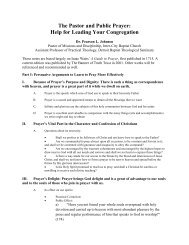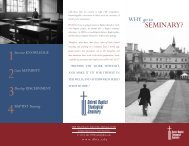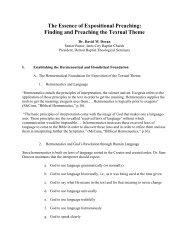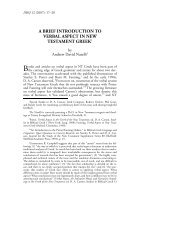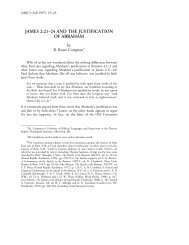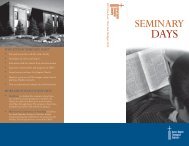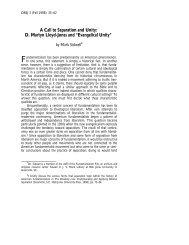1 Corinthians 13:8–13 and the Cessation of Miraculous Gifts
1 Corinthians 13:8–13 and the Cessation of Miraculous Gifts
1 Corinthians 13:8–13 and the Cessation of Miraculous Gifts
Create successful ePaper yourself
Turn your PDF publications into a flip-book with our unique Google optimized e-Paper software.
108 Detroit Baptist Seminary Journal1 <strong>Corinthians</strong> <strong>13</strong>:8Love never fails; but if <strong>the</strong>re are gifts <strong>of</strong> prophecy, <strong>the</strong>y will be doneaway; if <strong>the</strong>re are tongues, <strong>the</strong>y will cease; if <strong>the</strong>re is knowledge, it will bedone away.Paul develops his argument in <strong>13</strong>:8–<strong>13</strong> along two lines. His firstline <strong>of</strong> argument establishes <strong>the</strong> permanence <strong>and</strong> preeminence <strong>of</strong> love.He does this by developing a second line <strong>of</strong> argument which shows <strong>the</strong>temporary nature <strong>of</strong> miraculous gifts. Of <strong>the</strong> two lines, Paul spendsmost <strong>of</strong> his time proving <strong>the</strong> temporary nature <strong>of</strong> <strong>the</strong>se gifts; he mentions<strong>the</strong> permanence <strong>of</strong> love only at <strong>the</strong> outset <strong>and</strong> at <strong>the</strong> end <strong>of</strong> <strong>the</strong>passage. Yet his emphasis on <strong>the</strong> temporary nature <strong>of</strong> <strong>the</strong> miraculousgifts is intended to reinforce <strong>the</strong> permanence <strong>and</strong> value <strong>of</strong> love. Thus,<strong>the</strong> primacy <strong>of</strong> love is demonstrated in that love is permanent, <strong>and</strong> <strong>the</strong>miraculous gifts are not. 27At <strong>the</strong> same time, <strong>the</strong>re is an underlying polemical tone to Paul’sargument in this section. Paul’s emphasis on <strong>the</strong> temporary nature <strong>of</strong>miraculous gifts suggests that <strong>the</strong> Corinthian believers were elevating<strong>the</strong> miraculous gifts <strong>and</strong> especially tongues to enhance <strong>the</strong>ir own stature<strong>and</strong> to demonstrate <strong>the</strong>ir spiritual maturity. Paul counters this misunderst<strong>and</strong>ingby pointing out <strong>the</strong> temporary nature <strong>of</strong> <strong>the</strong>se gifts in contrastto <strong>the</strong> permanence <strong>of</strong> love. The implication from all <strong>of</strong> this appearsevident. Because it is both permanent <strong>and</strong> primary, love is <strong>the</strong> truegauge <strong>of</strong> spiritual maturity <strong>and</strong> directs how <strong>the</strong> temporary should beexercised. 28The Nature <strong>of</strong> <strong>the</strong> <strong>Gifts</strong>Two issues need to be addressed in this verse in light <strong>of</strong> <strong>the</strong> currentdebate. The first is to identify <strong>the</strong> nature <strong>of</strong> <strong>the</strong> gifts mentioned. Althoughsome argue to <strong>the</strong> contrary, <strong>the</strong> evidence from <strong>the</strong> immediate<strong>and</strong> larger contexts argues for taking prophecy, tongues, <strong>and</strong> knowledge<strong>Corinthians</strong>, Harper’s NT Commentaries (New York: Harper & Row, 1968), p. 299;Fee, The First Epistle to <strong>the</strong> <strong>Corinthians</strong>, pp. 627–28. Some include 12:31b in <strong>the</strong> firstsection <strong>of</strong> <strong>the</strong> chapter <strong>and</strong> separate <strong>13</strong>:<strong>13</strong> from <strong>the</strong> preceding verses to form a separatesection. See W. Harold Mare, 1 <strong>Corinthians</strong>, in vol. 10 <strong>of</strong> The Expositor’s Bible Commentary,ed. Frank E. Gaebelein (Gr<strong>and</strong> Rapids: Zondervan, 1976), p. 267. For recentdiscussion on <strong>the</strong> specific genre <strong>and</strong> structure <strong>of</strong> chapter thirteen, see Collins, First <strong>Corinthians</strong>,pp. 471–73, 483–85; Thiselton, The First Epistle to <strong>the</strong> <strong>Corinthians</strong>, pp.1027–32 (including bibliography); David E. Garl<strong>and</strong>, 1 <strong>Corinthians</strong>, Baker ExegeticalCommentary on <strong>the</strong> New Testament (Gr<strong>and</strong> Rapids: Baker, 2003), pp. 606–8.27 Similarly Fee, The First Epistle to <strong>the</strong> <strong>Corinthians</strong>, pp. 641–42.28 Similarly F. F. Bruce, 1 <strong>and</strong> 2 <strong>Corinthians</strong>, New Century Bible (Gr<strong>and</strong> Rapids:Eerdmans, 1971), p. 117; Fee, The First Epistle to <strong>the</strong> <strong>Corinthians</strong>, pp. 641–42.


